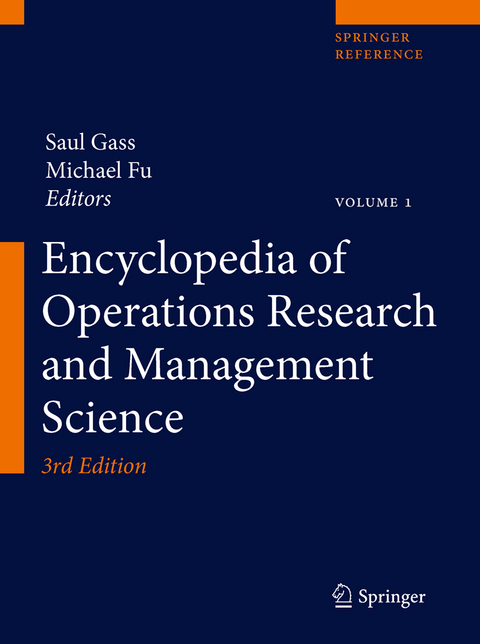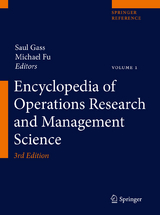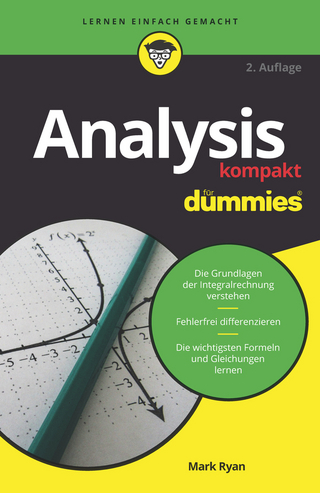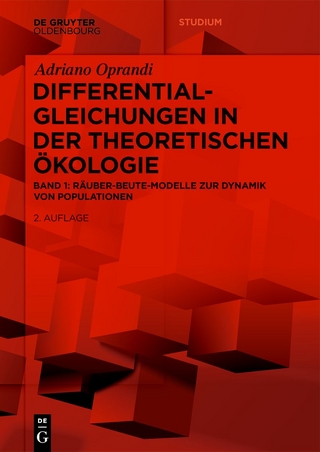Encyclopedia of Operations Research and Management Science
Springer-Verlag New York Inc.
978-1-4419-1137-7 (ISBN)
The goal of the Encyclopedia of Operations Research and Management Science is to provide decision makers and problem solvers in business, industry, government, and academia a comprehensive overview of the wide range of ideas, methodologies, and synergistic forces that combine to form the preeminent decision-aiding fields of operations research and management science (OR/MS). The impact of OR/MS on the quality of life and economic well being of everyone is a story that deserves to be told in its full detail and glory. The Encyclopedia of Operations Research and Management Science is the prologue to that story.
The editors, working with the Encyclopedia’s Editorial Advisory Board, surveyed and divided OR/MS into specific topics that collectively encompass the foundations, applications, and emerging elements of this ever-changing field. We also wanted to establish the close associations that OR/MS has maintained with other scientific endeavors, with special emphasis on its symbiotic relationships with computer science, information systems, and mathematics. Based on our broad view of OR/MS, we enlisted a distinguished international group of academics and
practitioners to contribute articles on subjects for which they are renowned. We commissioned over 200 major expository articles and complemented them by numerous descriptions, discussions, definitions, and abbreviations. The connections between topics are highlighted by an entry’s final “See” statement, as appropriate. Each article provides a background or history of the topic, describes relevant applications, overviews present and future trends, and lists seminal and current references. To allow for variety in exposition, the authors were instructed to present their material from their research and applied perspectives. In particular, the authors, each of whom is a leading authority on the particular subject, were allowed to use whatever mathematical notation they felt was standard fortheir topics.
The Encyclopedia’s intended audience is technically diverse and wide; it includes anyone concerned with the science, techniques, and ideas of how one makes decisions. As this audience encompasses many professions, educational background and skills, we were attentive to the form, format, and scope of the articles. Thus, the articles are designed to serve as initial sources of information for all such readers, with special emphasis on the needs of students.
Saul I. Gass received his B. S. in Education and M. A. in Mathematics from Boston University, and his Ph. D. in Engineering Science/Operations Research from the University of California, Berkeley. He is currently Professor Emeritus at the Robert H. Smith School of Business, University of Maryland, College Park. Dr. Gass first served as a mathematician for the Aberdeen Bombing Mission, U. S. Air Force, and then transferred to Air Force Headquarters where he began his career in operations research with the Directorate of Management Analysis, the organization in which linear programming was first developed. For IBM, he was an Applied Science Representative, Manager of the Project Mercury Man-in-Space Program, and Manager of IBM's Federal Civil Programs. He was a member of the Science and Technology Task Force of the President's Commission on Law Enforcement. He was Director of Operations Research for CEIR, Senior Vice-President of World Systems Laboratories,and Vice-President of Mathematica. He has served as a consultant to the U. S. General Accounting Office, Congressional Budget Office, the National Institute of Standards and Technology, and other operations research and systems analysis organizations. Included in his many publications are the texts Linear Programming (fifth edition) and Decision Making, Models and Algorithms, and the book An Illustrated Guide to Linear Programming. He is co-author of the book An Annotated Timeline of Operations Research: An Informal History. He is co-editor of the Encyclopedia of Operations Research and Management Sciences and A Guide to Models in Governmental Planning and Operations. Dr. Gass is a past president of the Operations Research Society of America (ORSA) and Omega Rho, the international operations research honor society. He served as vice-president for international activities of the Institute of Operations Research and the Management Sciences (INFORMS), and vice-president of the International Federation of Operational Research Societies (IFORS). He is a recipient of ORSA's Kimball Medal for distinguished service to the society and the profession, INFORMS's Expository Writing Award for publications in operations research that have set an exemplary standard of exposition, and the Military Operations Research Society's Jacinto Steinhardt Memorial Award for outstanding contributions to military operations research. He is a Fellow of INFORMS. He was a Fulbright Research Scholar at the Computer and Automation Research Institution, Hungarian Academy of Sciences. He is currently a Fulbright Senior Specialist. Dr. Gass is a University of Maryland Distinguished Scholar-Teacher and the Dean's Lifetime Achievement Professor for the Robert H. Smith School of Business. Dr. Michael Fu received his M.S. and PhD. degrees in applied mathematics from Harvard University in 1986 and 1989, respectively. He received S.B. andS.M. degrees in electrical engineering and a S.B. degree in mathematics from the Massachusetts Institute of Technology in 1985. Since 1989, he has been at the University of Maryland in the Robert H. Smith School of Business. Dr. Fu is a member of IEEE and the Institute for Operations Research and the Management Sciences (INFORMS). He is currently the Stochastic Models and Simulation Department Editor of Management Science, was Simulation Area Editor of Operations Research from 2000-2005, and has served on the Editorial Boards of the INFORMS Journal on Computing, Production and Operations Management, and IIE Transactions. He was named a Distinguished Scholar-Teacher at the University of Maryland for 2004-2005. In 1995, he received the Maryland Business School's annual Allen J. Krowe Award for Teaching Excellence. He is the co-author (with Jian-Qiang Hu) of the book, Conditional Monte Carlo: Gradient Estimation and Optimization Applications(1997), which received the 1998 INFORMS College on Simulation Outstanding Publication Award. Other awards include the 1999 IIE Operations Research Division Award and a 1998 IIE Transactions Best Paper Award. In 2002, he received ISR's Outstanding Systems Engineering Faculty Award, and in 2004-2005 he received the University of Maryland's Distinguished Scholar-Teacher Award.
Many of the 2nd edition articles have been updated by the original authors, with a few being totally rewritten by new authors. In addition, the following completely new articles have been added, each of which either describes a new topic or replaces a previous short entry: * Agent-Based Simulation* Air Traffic Management* Approximate Dynamic Programming* Business Intelligence* Closed-loop Supply Chains* Combinatorial Auction Theory* Community OR* Complementarity Applications* Computational Biology* Conditional Value at Risk * Convex Optimization* Critical Systems Thinking* Data Warehousing* Decision Analysis Practice* Deep Uncertainty* Differential Games* Disaster Management* Disease Prevention, Detection, and Treatment* Financial Engineering* Flexible Manufacturing Systems* Fuzzy Sets, Systems, and Applications* Global Optimization* Health Care Management* Health Care Strategic Decision Making* Heuristics* Hit and Run Methods* Influence Diagrams* Knowledge Management* Lagrangian Relaxation* Markov Chain Monte Carlo* Metaheuristics* Music* Open Source Software (and COIN-OR)* Operational Research Society* Petroleum Refining* Quadratic Assignment Problem * Rare Event Simulation* Regenerative Simulation* Response Surface Methodology * Revenue Management* Sample Average Approximation* Sensitivity Analysis* Service Science* Simulated Annealing* Societal Complexity* Statistical Ranking and Selection* Stochastic Approximation* Stochastic Input Model Selection
| Erscheint lt. Verlag | 15.10.2013 |
|---|---|
| Reihe/Serie | Encyclopedia of Operations Research and Management Science | 1.30 |
| Zusatzinfo | 38 Illustrations, color; 187 Illustrations, black and white; XXVI, 1641 p. 225 illus., 38 illus. in color. |
| Verlagsort | New York, NY |
| Sprache | englisch |
| Maße | 193 x 260 mm |
| Themenwelt | Mathematik / Informatik ► Mathematik ► Analysis |
| Mathematik / Informatik ► Mathematik ► Angewandte Mathematik | |
| Wirtschaft ► Allgemeines / Lexika | |
| Wirtschaft ► Betriebswirtschaft / Management ► Logistik / Produktion | |
| Wirtschaft ► Betriebswirtschaft / Management ► Unternehmensführung / Management | |
| ISBN-10 | 1-4419-1137-5 / 1441911375 |
| ISBN-13 | 978-1-4419-1137-7 / 9781441911377 |
| Zustand | Neuware |
| Haben Sie eine Frage zum Produkt? |
aus dem Bereich




